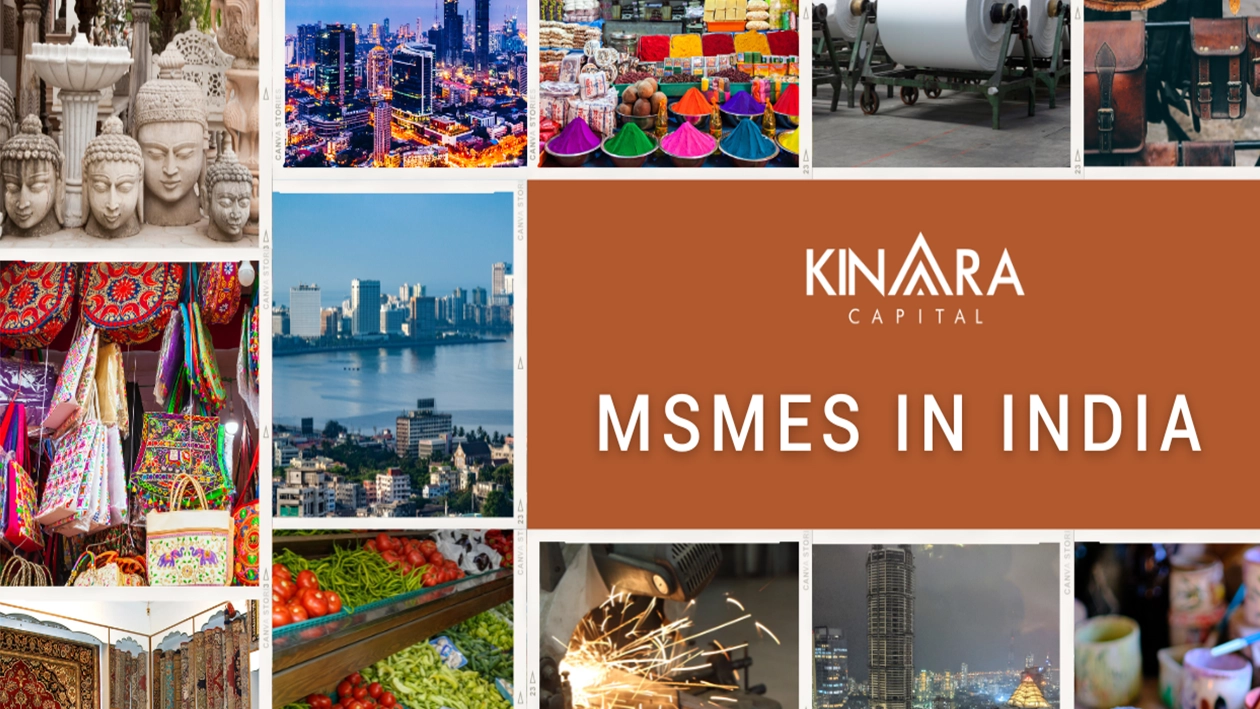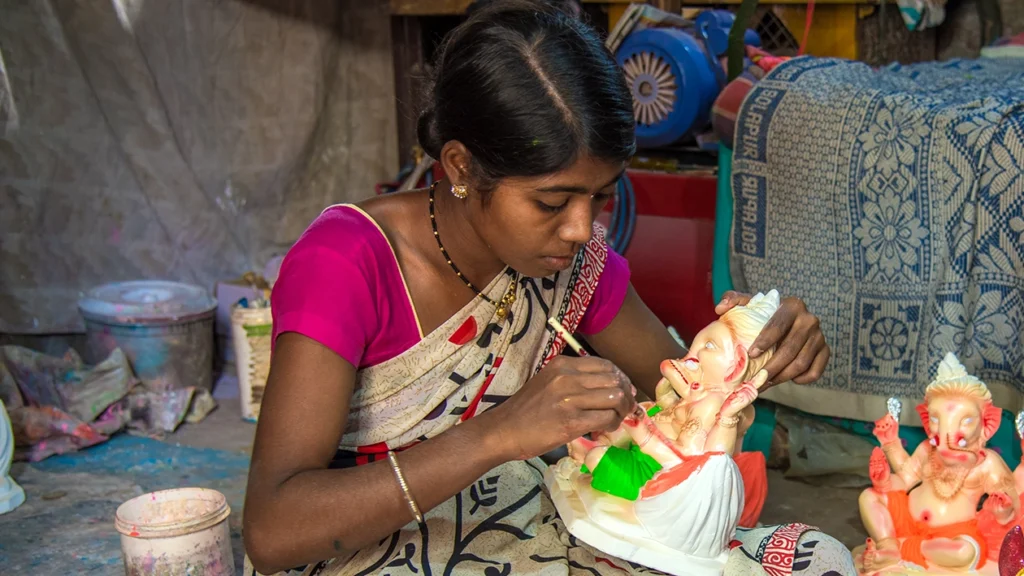
Micro Small and Medium Enterprises (MSMEs) are the cornerstone of the Indian economy, with their substantial impact felt in terms of employment generation across rural and urban sectors. These enterprises have played a key role in facilitating the industrialization of less developed areas, effectively reducing regional disparities and promoting a more inclusive distribution of national wealth and income.
The MSME sector is a critical part of the Indian economy. These small enterprises contribute significantly to the country’s GDP, exports, and employment. According to the Ministry of MSMEs, there are over 63 million MSMEs in India. These enterprises employ over 113 million people, which is about 40% of the country’s workforce. MSMEs also contribute about 30% of India’s GDP and 45% of its manufacturing output.
The MSME sector is important for a number of reasons. First, it provides jobs to millions of people, especially in rural areas. Second, it helps to promote entrepreneurship and innovation. They also help to diversify the Indian economy and to reduce poverty and inequality.
The Indian government has taken a number of steps to support the MSME sector, such as providing loans, tax breaks, and training programs. These measures have helped to boost the sector’s growth and contribute to the country’s economic development.
MSMEs have been the backbone of India’s economy for decades, playing a pivotal role in fostering entrepreneurship, generating employment opportunities, and driving inclusive growth. The history of MSMEs in India is intertwined with the nation’s journey towards economic development, providing a nurturing environment for small-scale enterprises to flourish and contribute significantly to the country’s GDP. This article takes a closer look at the evolution and significance of small businesses throughout India’s history.
The roots of MSMEs in India can be traced back to the pre-independence era when various cottage industries, handicrafts, and small-scale enterprises thrived. Traditional skills and craftsmanship were passed down through generations, creating a rich tapestry of diverse local industries. These small enterprises were the economic backbone of rural areas, contributing to the self-sufficiency of local communities.
The growth of MSMEs in India in recent years has been remarkable, driving economic development, job creation, and innovation. These enterprises have helped industrialise underdeveloped regions, reducing regional imbalances. Government support has further accelerated the growth and development of MSMEs in India, fostering innovation, entrepreneurship, and a more inclusive economic landscape.
The MSME in India plays a crucial role in the country’s economy by fostering employment and innovation. The categorisation of MSMEs is based on the investment in the plant and machinery equipment:
The MSME turnover limit ensures proper categorisation, enabling enterprises to access government schemes and benefits, driving their growth and competitiveness across various industries.
The role of MSMEs in India extends beyond economic contribution. They act as a critical link in the supply chain for large industries, boosting the development of various sectors such as textiles, food processing, and technology. MSMEs are crucial in promoting exports, as they contribute to about 48% of the country’s total exports. Their ability to adapt quickly to changing market conditions and technological advancements makes them a key player in India’s economic resilience.
Government initiatives such as financial support, digitalisation, and market access have further enhanced the growth and development of MSMEs in India, enabling them to scale up, compete globally, and contribute significantly to the nation’s economic progress.
With the advent of the digital age and technological advancements, MSMEs in India witnessed a new era of growth and innovation. E-commerce platforms and digital marketing enabled small businesses to reach a wider customer base and compete in the global marketplace. The government’s Digital India initiative further accelerated the digital transformation of small firms, facilitating online registrations, access to credit, and various e-governance services.

MSMEs have long been seen as being the foundation of India’s economy, making substantial contributions to the creation of jobs, innovation, and inclusive growth. Small businesses continue to play a significant role in the current environment despite a number of obstacles.
They have demonstrated remarkable resilience in adapting to the rapidly changing business environment. They have shown agility in embracing digital transformation and adopting innovative practices to stay competitive. With a strong focus on customer needs, small businesses are exploring new markets, both domestically and globally, to expand their reach. Moreover, their ability to quickly pivot operations during the COVID-19 pandemic showcased their adaptability and determination.
MSMEs are increasingly leveraging technology to streamline operations, enhance productivity, and improve customer experience. Embracing e-commerce, digital marketing, cloud computing, and automation has helped them tap into a broader customer base and optimize costs.
Many MSMEs are recognizing the importance of sustainability and incorporating eco-friendly practices in their operations. From using renewable energy sources to adopting waste management systems, they are aligning with global sustainability goals, enhancing their reputation, and attracting socially-conscious consumers.
MSMEs are forming partnerships and alliances to overcome resource limitations and gain a competitive edge. Collaborative networks enable them to pool resources, share knowledge, and jointly explore new business opportunities. This trend promotes collective growth and fosters innovation within the MSME sector.
The Indian government has taken several measures to support the growth and development of MSMEs. The Govt of India has launched several Government schemes for MSMEs, such as the:
Launched in 2020, this initiative aims to make India self-reliant by promoting local manufacturing, supporting innovation, and enhancing competitiveness. It includes measures such as access to credit, ease of doing business, and capacity-building programs for MSMEs.
The government’s Digital India program promotes the adoption of digital technologies by small businesses. Initiatives like digital payment platforms, e-marketplaces, and digital skill development programs have facilitated MSMEs’ transition into the digital economy.
The introduction of the Goods and Services Tax (GST) has simplified the tax structure for MSMEs, reducing the compliance burden and promoting a more transparent business environment. It has streamlined supply chains and improved overall efficiency.
These initiatives aim to enhance financial inclusion, promote entrepreneurship, and stimulate growth across the MSME sector.

Despite their resilience and government support, MSMEs face significant challenges:
Limited access to formal credit remains a major hurdle for MSMEs. High interest rates, complex loan procedures, and inadequate collateral deter financial institutions from lending to them. Encouraging more inclusive lending practices and promoting alternative financing options can help address this challenge.
MSMEs often struggle to find skilled labour, particularly in emerging technologies and specialized areas. This can lead to problems such as poor financial management, inefficient production processes, and a lack of marketing skills. Bridging the skill gap through vocational training programs and industry-academia collaboration is crucial for sustainable growth.
Inadequate infrastructure, including transportation, power supply, and digital connectivity, poses obstacles for MSMEs. Addressing these deficiencies is essential to unlock their full potential and ensure their competitiveness.
MSMEs often find it difficult to comply with India’s complex tax laws. This can lead to penalties and fines, which can put a strain on their finances.
MSMEs are not evenly distributed across India. They are more concentrated in certain states and regions, which can make it difficult for them to access markets and resources.
MSMEs are increasingly facing competition from foreign businesses. This can make it difficult for them to compete on price and quality.
India’s economic expansion and job creation are still being driven by MSMEs. Despite the difficulties they encounter, their adaptability, perseverance, and inventiveness help them to thrive in the modern environment. Small businesses in India can get past challenges and find a route to sustainable growth by utilising new trends and maximising government incentives.
The growth of MSMEs in India presents significant opportunities for entrepreneurs and the economy. With the growth and development of MSMEs in India, the sector has become a vital driver of employment, innovation, and industrialisation, particularly in rural and semi-urban areas. MSMEs play a crucial role in reducing regional disparities and promoting inclusive growth.
The opportunities in MSME are immense, ranging from manufacturing, services, and agriculture to new-age sectors like IT and e-commerce. The rise of digital technologies, alongside supportive government policies, has further fueled the growth of MSMEs in India, making it easier for small enterprises to expand their market reach and enhance operational efficiency.
Government schemes like the Atmanirbhar Bharat Abhiyan and initiatives supporting digitalisation have opened up new avenues for MSMEs, providing access to credit, digital platforms, and global markets. As India continues to focus on self-reliance, the growth and development of MSMEs will remain key to building a more robust and diversified economy.
The history of MSMEs in India reflects their resilience, adaptability, and contribution to the nation’s economic growth. From their humble beginnings to the present day, they have played a pivotal role in employment generation, inclusive development, and fostering entrepreneurship. The government’s continuous support and proactive measures will be crucial in nurturing and empowering MSMEs.
Moving forward, it is crucial for policymakers, financial institutions, and industry stakeholders to collaborate in addressing the challenges faced by MSMEs. Streamlining access to finance, enhancing skill development programs, and improving infrastructure will be instrumental in unlocking the full potential of small businesses. Additionally, fostering an enabling business environment with simplified regulations, promoting technology adoption, and nurturing a culture of entrepreneurship will further empower MSMEs to contribute to India’s economic development.
MSMEs should continue to embrace digital transformation, expand their market reach, and explore collaborations to drive innovation and remain competitive. By leveraging digital technologies, implementing sustainable practices, and forging strategic alliances, MSMEs can position themselves as key players in both domestic and global markets.
Various financial institutions provide funds to the MSME sector, one such FinTech Kinara Capital is dedicated to supporting the MSME sector financially. Kinara provides collateral-free business loans to small business owners to expand their operations. To apply for a business loan, MSME owners can check their loan eligibility in the myKinara application which is available to download from the Google PlayStore. The application offers 7 vernacular language options to choose from to make sure that the customer can navigate comfortably through the application.
Once the owner passes the eligibility check, they will have to submit the minimum documents which will be verified by the fully secured digital platform and the loan amount will be transferred to the applicant’s bank account. Also, we have a dedicated customer support team available between Monday – Friday (9.30 AM – 6.00 PM) at our toll free number 1800-103-2683 for any questions or assistance. This ensures that entrepreneurs can get the help they need throughout the loan process.
In conclusion, small businesses in present-day India embody the entrepreneurial spirit. They have the potential to contribute significantly to economic growth, job creation, and inclusive development. With continued support from the government, stakeholders, and society at large, MSMEs can overcome challenges and emerge as a vital force in shaping India’s prosperous future.
MSMEs are a significant source of employment, generating over 120 million jobs across various sectors in India, particularly in rural and semi-urban areas.
Innovation helps MSMEs improve products, streamline operations, and enhance customer experience, fostering competitiveness and growth in the marketplace.
MSMEs can expand their market presence by leveraging digital platforms, participating in e-commerce, improving product quality, and adopting effective marketing strategies.
With government support, digital transformation, and innovation, the future of MSMEs looks promising. There is potential for significant growth in domestic and global markets.
MSMEs like Amul, Paper Boat, and Jaipur Rugs have grown from small enterprises to well-known brands by leveraging innovation, digital platforms, and strong marketing.
MSMEs can focus on social media marketing, collaborations, influencer marketing, and participating in online marketplaces to reach wider audiences.
MSMEs can access financial support through government schemes like Mudra Loans, SIDBI, and collateral-free loans from banks and NBFCs.
